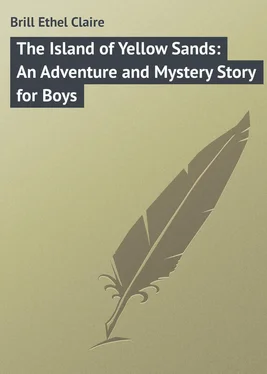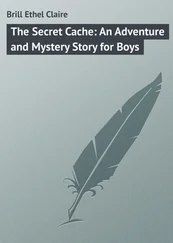Ethel Brill - The Island of Yellow Sands - An Adventure and Mystery Story for Boys
Здесь есть возможность читать онлайн «Ethel Brill - The Island of Yellow Sands - An Adventure and Mystery Story for Boys» — ознакомительный отрывок электронной книги совершенно бесплатно, а после прочтения отрывка купить полную версию. В некоторых случаях можно слушать аудио, скачать через торрент в формате fb2 и присутствует краткое содержание. Жанр: foreign_prose, Прочие приключения, foreign_language, на английском языке. Описание произведения, (предисловие) а так же отзывы посетителей доступны на портале библиотеки ЛибКат.
- Название:The Island of Yellow Sands: An Adventure and Mystery Story for Boys
- Автор:
- Жанр:
- Год:неизвестен
- ISBN:нет данных
- Рейтинг книги:4 / 5. Голосов: 1
-
Избранное:Добавить в избранное
- Отзывы:
-
Ваша оценка:
- 80
- 1
- 2
- 3
- 4
- 5
The Island of Yellow Sands: An Adventure and Mystery Story for Boys: краткое содержание, описание и аннотация
Предлагаем к чтению аннотацию, описание, краткое содержание или предисловие (зависит от того, что написал сам автор книги «The Island of Yellow Sands: An Adventure and Mystery Story for Boys»). Если вы не нашли необходимую информацию о книге — напишите в комментариях, мы постараемся отыскать её.
The Island of Yellow Sands: An Adventure and Mystery Story for Boys — читать онлайн ознакомительный отрывок
Ниже представлен текст книги, разбитый по страницам. Система сохранения места последней прочитанной страницы, позволяет с удобством читать онлайн бесплатно книгу «The Island of Yellow Sands: An Adventure and Mystery Story for Boys», без необходимости каждый раз заново искать на чём Вы остановились. Поставьте закладку, и сможете в любой момент перейти на страницу, на которой закончили чтение.
Интервал:
Закладка:
The third day of the trip a sudden storm compelled the brigade to seek the refuge of a sheltered bay. The two canoes in which the boys traveled were beached nearly half a mile apart. During the storm, which lasted into the night, the lads were unable to get together. The next morning the sky was clear again, but a violent northwest wind prevented the launching of the boats. Since they could not go on, the canoemen were at liberty to follow their own devices. Some of them sat around the fires they had kindled in the lea of rocks and bushes, mended their moccasins and other clothing, and told long tales of their adventures and experiences. Others wandered about the beach and the adjacent woods, seeking for ripe raspberries or hunting squirrels, hares and wood pigeons. A group of Indian wigwams on a point was visited by a few of the men, who bartered with the natives for fish, maple sugar and deerskin moccasins.
For Ronald the Indian fishing camp had no particular attraction, and he started to walk around the bay to the place where Jean’s canoe was beached. On the way he climbed a bluff a little back from the water, and lingered to eat his fill of the ripe wild raspberries that grew along the top. As he pushed his way through the brush, he heard the sound of voices from the beach below and recognized the harsh, rough tones of Le Forgeron. Just why he turned and went to the edge of the bluff in the direction of the voices, Ronald did not know. Instinct seemed to tell him that the Twisted Blacksmith was up to some mischief. Parting the bushes, he looked down on an Indian lodge. He was surprised to see a wigwam in that place, for it was at least a quarter of a mile from the point where the temporary village stood. Near the wigwam Le Forgeron was sitting cross-legged on a blanket, smoking at his ease, while a squaw, bending over a small cooking fire, was preparing food for him, venison, the boy’s nose told him, as the savory odor rose on the wind.
“Make haste there, thou daughter of a pig,” the Blacksmith was saying roughly, “and take care that the meat is not burned or underdone or I will burn thee alive in thine own fire.”
The Indian woman shrank back as if frightened, and, as she turned her head, Ronald saw that she was old and withered, and, from the way she groped about, he judged her to be nearly if not quite blind. She made a motion to withdraw from the fire the piece of venison she was broiling on a wooden spit, that rested on two sticks driven into the ground, but, whether through fear or blindness, she struck the stick with her hand instead of grasping it, and spit and meat went into the fire.
Le Forgeron uttered an ugly oath and sprang to his feet. “I’ll teach you how to broil meat, old witch,” he cried. Before Ronald could free himself from the bushes, the Blacksmith had seized the frightened old woman and had thrust her moccasined foot and bare ankle, for she wore no leggings, into the fire. She gave a scream of pain and terror, and Ronald, without pausing to think, launched himself over the edge of the bluff in a flying leap. He landed on the sand close to where the old squaw was struggling in Le Forgeron’s grasp, and brought a stout stick, that he had used a few moments before to kill a snake, down on the Blacksmith’s neck and shoulder. Surprised at the attack, Le Forgeron flung the squaw from him and turned on the boy, reaching for his knife as he did so. He made a quick lunge at Ronald, who jumped aside just in time and seized him by the arm that held the knife. At the same moment he heard a shout from beyond the lodge and recognized Jean’s voice. Ronald, though a strong and sturdy lad, was no match for Le Forgeron, but he hung on to the Frenchman’s right arm like a bulldog. The Blacksmith flung his left arm out and around the boy’s waist, to crush him in his iron grasp. Ronald heard Jean’s shout close by, and then, just as he thought his body would be crushed in the Blacksmith’s terrible grip, there came from the top of the bluff a roar like that of a mad bull, and Benoît le Gros launched his great body down on the struggling pair as if to bury them both.
But Big Benoît did not bury Ronald. The boy went down on the sand, found himself loose, rolled completely over and picked himself up, just in time to see the giant foreman hurl his steersman into the breakers that were rolling on the beach. Then he strode in after him, seized him by the back of the neck and pulled him out again, dazed, bloody, choking with the water he had swallowed. Le Forgeron Tordu was beaten. There was no fight left in him for the time being, but he was far from being subdued. He cast an ugly look at the two boys, but for the moment he was unable even to swear. With an imperious gesture Big Benoît motioned him to go back down the beach towards camp. Le Forgeron went, but as he passed Ronald he gave him a look so full of vindictive hatred it fairly chilled the lad’s blood. There was no need of voice or words to express the threat of vengeance. That look was enough.
In the meantime the Indian woman had disappeared, and, though the boys sought for her to discover how badly she had been burned and to see if they could do anything to relieve her suffering, they could not find her. When Ronald returned to the camping place of his own crew, he found the brigade guide in conversation with Big Benoît. The boy was summoned to tell his story, and did so in a few words. He admitted having attacked Le Forgeron first and gave his reason. Benoît added his evidence, for he had seen the Indian woman crawl away and thrust her smoking, blackened moccasin into the water. The guide grunted a malediction upon Le Forgeron, whom he called the “king of fiends,” and dismissed the boy. Later Benoît informed him that he had been transferred to the canoe where Jean was, and added, with a grin, that he was sorry to lose a lad who was not afraid to attack the Blacksmith, but that it was best the two should be separated. “Look to yourself, my son,” he said, laying a kindly hand on the boy’s shoulder. “Le Forgeron does not forget a grudge.”
For two days strong winds prevented the continuance of the journey, but Ronald, having been transferred to the same canoe with Jean, kept clear of Le Forgeron.
The delay vexed the impatient boys, who felt that every lost hour was shortening the time they could give to the search for the strange island. At last, during the night, the wind changed to another quarter and went down, and for the remainder of the voyage the weather was generally favorable. There were several delays, but none so long as the first, and the Sault was reached in fairly good time.
The visits of the brigades were the great events of the year at the trading post of Sault de Ste. Marie. The few whites and half-breeds that formed the little settlement, and most of the Indians of the Ojibwa village near by, were on hand to receive the voyageurs. But Nangotook, who should have been awaiting the boys, was nowhere to be seen.
The Northwest Company’s agent and Jean’s friends had expected the lads to go on to Montreal with the fleet, and the two were hard put to it to find excuses for lingering. The men who had been injured in the accident of the spring before, and who had been left behind to recover, were strong enough to resume their places at the paddles, so the lads’ services were not actually needed, and no pressure was put upon them to go on. As day after day of impatient waiting passed without any sign of their Indian guide, Jean and Ronald began to wonder if they had been foolish to remain behind. Until the prospect of adventure and riches had opened before them, they had not dreamed of spending another winter at the Sault. Even when they had decided not to go on with the fleet, they had hoped that they might accomplish their treasure-seeking trip in time to allow them to return to Montreal or at least to Michilimackinac, under Etienne’s guidance, before winter set in.
Читать дальшеИнтервал:
Закладка:
Похожие книги на «The Island of Yellow Sands: An Adventure and Mystery Story for Boys»
Представляем Вашему вниманию похожие книги на «The Island of Yellow Sands: An Adventure and Mystery Story for Boys» списком для выбора. Мы отобрали схожую по названию и смыслу литературу в надежде предоставить читателям больше вариантов отыскать новые, интересные, ещё непрочитанные произведения.
Обсуждение, отзывы о книге «The Island of Yellow Sands: An Adventure and Mystery Story for Boys» и просто собственные мнения читателей. Оставьте ваши комментарии, напишите, что Вы думаете о произведении, его смысле или главных героях. Укажите что конкретно понравилось, а что нет, и почему Вы так считаете.












